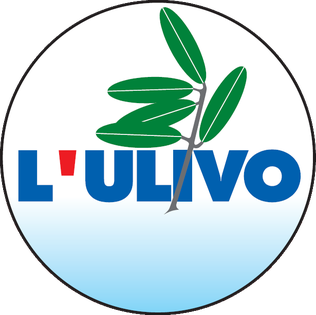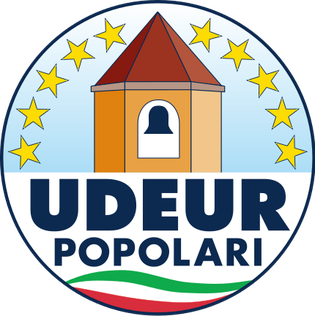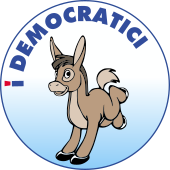
The Democrats of the Left was a social-democratic political party in Italy. Positioned on the centre-left, the DS, successor of the Democratic Party of the Left (PDS) and the Italian Communist Party, was formed in 1998 upon the merger of the PDS with several minor parties. A member of The Olive Tree coalition, the DS was successively led by Massimo D'Alema, Walter Veltroni, and Piero Fassino, and merged with Democracy is Freedom – The Daisy and a number of minor centre-left parties to form the Democratic Party in October 2007.

The Olive Tree was a denomination used for several successive centre-left political and electoral alliances of Italian political parties from 1995 to 2007.

Democracy is Freedom – The Daisy, commonly known simply as The Daisy, was a centrist political party in Italy. The party was formed from the merger of three parties within the centre-left coalition: the Italian People's Party, The Democrats and Italian Renewal. The party president and leader was Francesco Rutelli, former mayor of Rome and prime ministerial candidate during the 2001 general election for The Olive Tree coalition, within which The Daisy electoral list won 14.5% of the national vote.

Pier Ferdinando Casini is an Italian politician. He served as President of the Chamber of Deputies from 2001 to 2006.

The Christian Democratic Centre was a Christian-democratic political party in Italy from 1994 to 2002. Formed from a right-wing split from Christian Democracy, the party joined the centre-right coalition, and was a member of the European People's Party (EPP).

The Democratic Party of the Left was a democratic-socialist and social-democratic political party in Italy. Founded in February 1991 as the post-communist evolution of the Italian Communist Party, the party was the largest in the Alliance of Progressives and The Olive Tree coalitions. In February 1998, the party merged with minor parties to form Democrats of the Left. At its peak in 1991, the party had a membership of 989,708; by 1998, it was reduced to 613,412.

The 1996 Italian general election was held on 21 April 1996 to elect members of the Chamber of Deputies and the Senate of the Republic. Romano Prodi, leader of the centre-left The Olive Tree, won the election, narrowly defeating Silvio Berlusconi, who led the centre-right Pole for Freedoms.

The Italian People's Party was a Christian-democratic, centrist and Christian-leftist political party in Italy. The party was a member of the European People's Party (EPP).
The Democratic Union was a small social-liberal political party in Italy.

Arturo Parisi is an Italian politician, leader of the Ulivist faction of the Democratic Party and a four-time member of the Italian Chamber of Deputies. He was also minister of defence in the cabinet of Prime Minister Romano Prodi from 2006 to 2008.

The Democratic Party is a social democratic political party in Italy. The party's secretary is Elly Schlein, elected in the 2023 leadership election, while the party's president is Stefano Bonaccini.

The Pact for Italy was a centrist political and electoral alliance in Italy launched by Mario Segni and Mino Martinazzoli in 1994.

The Alliance of Progressives was a left-wing political alliance of parties in Italy formed in 1994, with relevant predecessors at local level in 1993. The leader of the alliance was Achille Occhetto. The alliance was a predecessor of the modern-day centre-left coalition.

The Liberal Democrats, whose complete name is Liberal Democrats for Renewal, is a liberal and centrist political party in Italy.
The Olivists (Ulivisti) are a faction within the Democratic Party (PD), a political party in Italy.

Massimo D'Alema is an Italian politician and journalist who was the 53rd prime minister of Italy from 1998 to 2000. He was Deputy Prime Minister of Italy and Italian Minister of Foreign Affairs from 2006 to 2008. D'Alema also served for a time as national secretary of the Democratic Party of the Left (PDS). Earlier in his career, D'Alema was a member of the Italian Communist Party (PCI) and was the first former Communist party member to become prime minister of a NATO country and the only former PCI prime minister of Italy. Due to his first name and for his dominant position in the left-wing coalitions during the Second Republic, he is referred to as Leader Maximo. He is also the author of several books.

The Pole for Freedoms was a centre-right political and electoral alliance in Italy, which was active from 1996 to 2000. It included Forza Italia (FI), the National Alliance (AN), Union of the Centre (UdC), Christian Democratic Centre (CCD), United Christian Democrats (CDD), and Pannella–Sgarbi List.

The Union of Democrats for Europe, also known as UDEUR Populars, was a minor centrist, Christian-democratic political party in Italy.
The centre-left coalition is a political alliance of political parties in Italy active under several forms and names since 1995, when The Olive Tree was formed under the leadership of Romano Prodi. The centre-left coalition has ruled the country for more than fifteen years between 1996 and 2021; to do so, it had mostly to rely on a big tent that went from the more radical left-wing, which had more weight between 1996 and 2008, to the political centre, which had more weight during the 2010s, and its main parties were also part of grand coalitions and national unity governments.
















